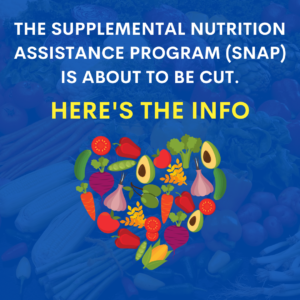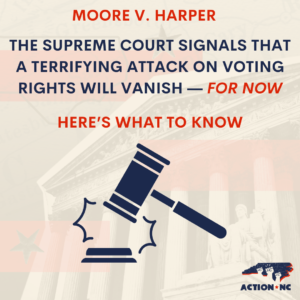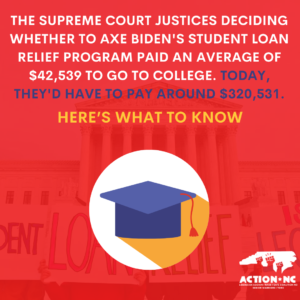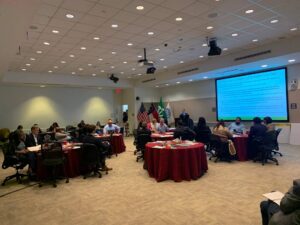Protestors Speak Out Against Fayetteville Youth Violence Curfew
The Fayetteville City Council votes on a curfew Monday night, which could charge teens with misdemeanors and fine parents $100.
Reporter : Willie Daniely
Reporter : Julian Grace
Web Editor : Joseph Ochoa
Liberal Protesters Arrested In Capitol Over Debt Ceiling Demonstration
Summary: Action NC members joined the Center For Popular Democracy (CPD) on Capitol Hill to protest potential cuts to essential programs like Medicaid and Food Stamps as well as climate change funding. After meeting with members of congress urging them to fight against the proposed Debt Ceiling deal, the activists sat in the Cannon Rotunda chanting "Default equals death," "No cuts to Medicaid," and "No cuts to climate." The Capitol Police arrested 12 people. Both the Washington Examiner and Fox News covered the action.
A Grandma's Wish To Survive

“The best way to honor mothers this Mother’s Day is for Congress to do what’s right: pay the nation’s bills by raising the borrowing limit to assure a stable economy and avoid default,” writes Carrol Olinger, a Cumberland County resident.
This Mother’s Day, I’m celebrating being the proud mother of four daughters, one son, and five grandchildren. My children are my pride and joy, and throughout my life they have been my top priority. Today, even as a retired educator, and seasoned community leader, I still worry more about my children than anything else in the world.
And, unfortunately, I have good reason to worry given the current debate about national default in Congress. Our economic future, our healthcare, education for our children–all of it is at risk because of the upside-down priorities of many elected leaders that are putting my children–and everyone else’s–in harm’s way.
For most of us, paying the bills comes first. It comes before luxuries, before upgrades, before whims–that’s what I taught my children.
But some leaders in Congress clearly don’t agree with me.
Speaker Kevin McCarthy’s default plan would only enable the United States to keep paying its debts on time if Congress also slashes spending on everything from veterans’ health to public safety and education. If Democrats don’t agree to these cuts, Speaker McCarthy and Republicans in Congress will not agree on a lift the borrowing limit so the United States can keep paying bills on time and avoid default.
Default means that, as early as June 1st, the federal government will no longer be able to pay on obligations it owes everyone from foreign governments to Medicare providers, causing widespread panic in the economy, hastening recession, and undermining the credit of our government abroad.
McCarthy has the wrong priorities: instead of working with the President and other leaders in Congress on passing a clean debt ceiling bill that will keep our country stable and protect us from economic harm–as Congress has done over 70 times in the last 60 years–he’s playing chicken with the economy.
A grandma’s wish to survive is turning into a nightmare! I shouldn’t have to wish for basic needs for myself, my grandkids and the American people.
The GOP bill that McCarthy already passed in the House proposes cuts in everything from Medicaid, Meals on Wheels, and education funding to rail inspections, while at the same time also watering down tax enforcement for families making $400,000 or more. That means that wealthy households will continue to pay less in taxes than many middle-class families do while the rest of us face higher costs in healthcare, housing, food, and other expenses because of the cuts to these programs.
People like my daughter, who has been unable to get steady health coverage for years, may lose what access to Medicaid she has because of these cuts. So could many others, including low-wage workers who can’t get affordable coverage on the job, veterans, kids and more. Another cause for worry: millions of people are already losing coverage and losing food stamps because of the end of the COVID-19 public health emergency—this could make everything worse.
In North Carolina alone, an estimated 54,000 women, infants, and children would lose vital nutrition assistance through the Special Supplemental Nutrition Program for Women, Infants, and Children (WIC) and 16,700 families would lose access to rental assistance, according to a federal analysis. As many as 284,200 veterans could lose outpatient visits, leaving them unable to get appointments for care like wellness visits, mental health services, and substance disorder treatment. Cuts to basics like healthcare, education and housing should be the last thing any mom in America should have to worry about, on Mother’s Day, or any other time.
The best way to honor mothers this Mother’s Day is for Congress to do what’s right: pay the nation’s bills by raising the borrowing limit to assure a stable economy and avoid default. Then, rather than arguing about what’s going to be cut, start making the rich and corporations pay what they owe, at the minimum their fair share!
NC SNAP program

Here's what's happening: The Supplemental Nutrition Assistance Program (SNAP) is about to be cut.
In response to the ongoing COVID-19 outbreak, Congress authorized states to use temporary SNAP emergency allotments (EAs) in March 2020. Additional benefits from SNAP during the pandemic were very important for many people to meet their families’ nutritional needs.
But for millions of families, the deadline for SNAP EAs just ended this month in most U.S. states and territories. Because of this change, when the EAS runs out, the average SNAP benefits will drop to just $6 per day per person.
At the minimum benefit level, older people will be hurt the most because their monthly SNAP benefits will go from $281 to $23, but everyone who gets SNAP will be affected. Families need a stronger SNAP program because costs for food, housing, transportation, childcare, etc., are increasing while SNAP extensions are ending.
In the past few months, the Republican-controlled US House of Representatives has made several threats against SNAP, such as calling for stricter work requirements that would make it harder for hungry families to get the food they need (note: SNAP already has a stringent work requirement for many individuals). The US House GOP also threatens to cut benefits even more drastically.
Here in NC, our emergency SNAP benefits ended in February. If your own SNAP benefits are going to be cut, reporting changes might help you get more food stamps. Click on this link to learn more about what reporting changes could be helpful to you.
https://legalaidnc.org/extra-food-stamps-are-ending/
Despite the EA cuts, Pandemic-EBT benefits in North Carolina will continue for the 2022-23 school year until the federal Public Health Emergency ends on May 11, 2023.
This year, Congress will pass a new Farm Bill. This is the main legislation that says how SNAP works and what benefits will be. We must ensure that our leaders take advantage of this chance to assist struggling families and give them the help they need. We must also ensure that our elected leaders know that SNAP benefits the economy. For every dollar spent on SNAP, between $1.50 and $1.80 is spent in the economy.
To find your local DHHS office, where you can learn more about your benefits and the possibility of increasing them, click the first link. For information on food bank resources, click on the second link.
https://www.ncdhhs.gov/divisions/social-services/local-dss-directory
https://www.needhelppayingbills.com/html/north_carolina_food_banks.html
The Supreme Court signals that a terrifying attack on voting rights will vanish — for now

Moore v. Harper endangers elections in the United States. Now it seems likely to disappear.
"Moore v. Harper, a lawsuit the Supreme Court heard last December, poses the biggest threat to US democracy since the January 6 attack on the US Capitol — although it’s worth noting that even some of the Court’s more conservative members seemed to recoil at some of the case’s implications when they heard oral arguments in Moore in December.
On Thursday, the justices signaled that they are likely to take an off-ramp from this case. The Court released a brief, one-paragraph order indicating that this case may simply disappear." - Vox
International Women's Day

March 8, 2023 marks International Women’s Day, a chance to celebrate women everywhere and be reminded of the inequalities women face everyday.
Here are 8 ways you can empower women:
1 – PROVIDE FINANCIAL SOLUTIONS
2 – TEACH VOCATIONAL AND BUSINESS SKILLS
3 – INCREASE INCOMES AND SAVINGS
4 – BUILD SELF-ESTEEM AND CONFIDENCE
5 – IMPACT HEALTH
6 – BUILD SOCIAL NETWORKS
7 – CREATE PUBLIC LEADERS
8 – TELL THE WOMEN IN YOUR LIFE THAT YOU CARE
Through meaningful collaboration, we can help women advance and unleash the limitless potential they offer to economies throughout the world.
#womensinternationalday #happywomensinternationalday #supportwomen #empowerwomen #womendeserveequalpay #womensequality #actionnc #rageactionnc #rage
Biden's Student Loan Relief Program

The court's ruling would impact the lives of millions of student loan borrowers including the 20 million borrowers that the White House estimates would have their balances completely wiped out. But according to historical tuition data, the price of college has changed astronomically since the justices were in school.
Four of the nine justices graduated throughout the 1970s, a time when the average student loan debt was around $1,000, according to data from the research group The Education Data Initiative. By 2021, the average student debt at graduation was around $31,000, the group reported, citing federal data.
It’s unlikely we’ll know how the justices will rule until June, but spectators on both sides of the issue found reasons to celebrate after Tuesday, February 28, 2023 arguments.
Charlotte Summit Takeaways

Apryl Lewis, a community organizer with housing justice organization Action NC, raised concerns during a two-day housing and jobs summit in Charlotte. Lewis emphasized the need for additional funding directed towards grassroots organizations that directly assist Charlotteans in securing jobs and housing. This plea comes as the city grapples with a growing affordable housing crisis, with rising construction prices and a population increase.
Lewis's call for support to grassroots organizations aligns with the broader discussions at the summit, where City Council members questioned the efficacy of the city's regular $50 million allocations for affordable housing. The summit aimed to address the worsening affordable housing situation in Charlotte and explore potential solutions and policy changes.
The survey results presented at the summit indicated that affordable housing development was a top priority for stakeholders, emphasizing the importance of supporting the production and preservation of affordable housing units, reducing homelessness, and addressing housing instability. Lewis's advocacy for directing funds to grassroots organizations reflects a broader push for more targeted and impactful strategies in addressing the affordable housing crisis.
The housing summit also delved into topics such as job creation, the role of grassroots organizations, potential subsidies for existing apartments, and the evolving nature of the labor force in Charlotte. The discussions highlighted the complexity of the challenges faced by the city and the need for comprehensive and community-driven solutions.
Housing Justice Coalition Call to Action:
Tenants’ Rights
1. City and County governing bodies shall fund and enact the Right to Counsel:
Representation for tenants in eviction proceedings;
2. City and County governing bodies shall facilitate education about eviction process through grassroots organizations and government (i.e. appeal);
3. City Council shall pass an ordinance for Housing voucher acceptance that eliminates source of income discrimination
4. Local governing bodies shall enact Right of first refusal for tenants when landlord decides to sell a property;
5. The City and the County alongside nonprofits and legal advocates shall work toward the establishment of Eviction expungement at the local level;
6. The City shall track and publish annual Housing metrics such as the number of summary ejectments filed in Mecklenburg County Small Claims Court;
7. Housing Justice Coalition CLT shall work toward creating metrics to measure the impact of local housing organizing groups, nonprofits, and advocacy organizations;
8. Landlords shall create incentives for tenants who attend housing trainings on tenants’ rights and obligations convened by organizations such as TORC, Eviction is Real, Inc, and other tenant advocacy groups;
9. The City shall promote and provide logistical, financial and material support for social housing, land banking, especially as alternatives to selling city-owned land to private developers.
10. The City shall create an office for Tenant/renter assistance and counseling;
Gentrification & Displacement
11. Housing Justice Coalition CLT shall create organizing toolkits to empower neighborhoods and community associations with tools to create community power and to hold leaders accountable;
12. The City shall pass Local legislation that increases the oversight & accountability of community members in local decision making impacting displacement;
13. The City and County shall increase funding for programs that are preventing displacement such as RAMP, Tax relief programs and other related programs;
14. The City shall facilitate the procurement of materials, land and resources for local organizations seeking to preserve land/housing and provide additional opportunities for upward economic mobility in rapidly gentrifying areas;
15. The City and County shall aggressively fund community land trusts and provide a right of first refusal to community land trusts when City or County owned land is up for sale;
16. City Code Enforcement shall not enforce demolition of home owner occupied homes in distressed neighborhoods wherein there are high levels of displacement;
17. The City shall increase Down payment assistance funds and speed up the process for these funds to reach prospective homebuyers;
18. The City and County shall take immediate action to curtail corporations from buying homes. This includes but it is not limited to strengthening provisions of the proposed UDO overlay districts, providing logistical support for the use of restrictive covenants in applicable neighborhoods, passing an ordinance to further protect neighborhoods etc;
19. The County shall reinstate and where applicable, make property tax relief plans more available to a wider range of citizens;
20. The County shall increase homestead tax exemptions based on what is exempted by the Homestead Act and the full tax bill in addition to lowering the age requirement for eligibility for homestead tax exemption;
Community Benefits & Development Policy
21. The City shall pass a Community Benefits Ordinance that mandates community benefits for projects that receive public incentives similar to the ordinance recently passed in Richmond, VA. (public land, tax incentives etc.);
22. The City shall adopt a robust community benefits package with reference to the Community Benefits Task Force;
23. The City shall expand community notifications and alerts to community groups such as Housing Justice Coalition CLT and the Charlotte Community Benefits Coalition for community meetings regarding developments that impact neighborhoods (such as rezonings, City Council votes on issues that impact neighborhoods);
24. The City shall generate and disseminate a map of pending developments with information about community meetings, project timelines etc;
25. The City shall create a Comprehensive impact assessment for development projects that receive at least $10 million in public funding;
26. The City and County shall establish a cap on campaign donations from developers and create standard accountability metrics on such donations;
27. The City and County shall enact an Excise tax on development projects as an incentive to generate public benefits for development projects that receive public funding;
28. The City shall require any development project that receives public funding to provide a minimum of 20% affordable housing as a contractual obligation for receiving public funds.
Final Statements
29. Local governing bodies shall take all available actions and utilize all available resources to make housing as a human right a reality for all citizens;
30. Housing Justice Coalition CLT will continue to work for housing as a human right through education, policy advocacy and community organizing informed by our mission and this platform;
31. Housing Justice Coalition CLT will continually reassess and amend this platform as necessary to address material conditions of houselessness and economic injustice in the Charlotte Mecklenburg area
The Right to Housing is Becoming a Reality
Backed by faith communities, the housing justice movement is racking up wins against landlords and banks profiting off of what should be a human right.
Apryl Lewis is in a housing fight — again. This time, she is pushing to keep dozens of families from being put out of a Charlotte extended-stay motel that is scheduled to be shut down in a matter of weeks. Such motels cost as much as $500 each week, expensive compared to long-term housing. But many of these families are living paycheck-to-paycheck or on fixed incomes, and have no other option.
“They can’t afford the move-in costs for an apartment,” Lewis said. “Landlords want up-front rent and utilities and a security deposit. Now they are even making people pay for rental insurance.”
Others stay at the motel because they are shut out of traditional housing due to a past eviction or criminal record. Some simply can’t find a suitable place to live in a time when rental vacancies are at historic lows.
The good news for the motel residents is that this is not Lewis’s first fight. An organizer for Action NC, Lewis coordinated “Cancel Rent” protests at the local courthouse in the early days of the COVID pandemic, led tenants in chants of “housing is a human right” at various government meetings, and organizes canvassing and phone banks, pulling together tenants to advocate for their rights. A current focus is calling out corporate landlords, like the one in Charlotte who was repeatedly cited for refusing to address rampant mold, vermin and dangerous wiring.
Read more: https://wagingnonviolence.org/2022/10/how-activists-are-making-right-to-housing-reality/